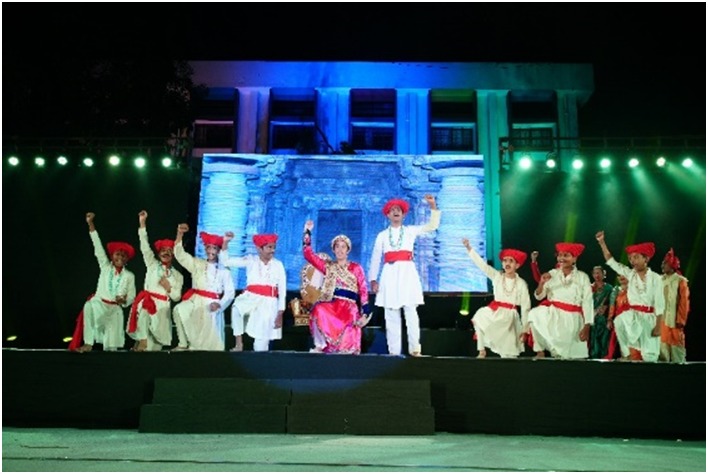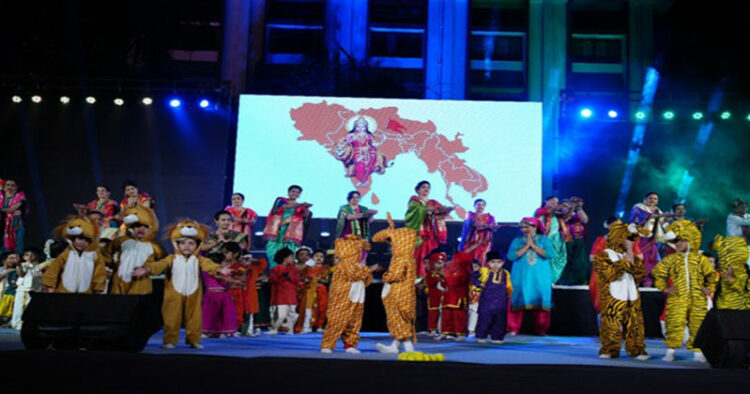Today’s present is tomorrow’s history and today’s children are future citizens of the country. Even though the adage is an old one, it has not lost its meaning. Keeping this in mind, there are attempts to imbibe the eternal (sanatana) values in the younger generation and what better ways would be there than presenting these values through the retelling of our history. Add the aspect of entertainment, arts and music to it and it reaches straight to the mind.
One such endeavour was made in Pune when a resplendent and shining history of Bharat was presented to the kids and elders alike and that too by the children themselves. The glorious era of ancient India like Chanakya and Chandragupta, the struggle during the middle ages led by Chhatrapati Shivaji Maharaj, the freedom struggle of modern era beginning with independence war of 1857, contribution of great men such as Vasudev Balwant Phadke, Lokmany Tilak, Veer Savarkar, Sardar Vallabhbhai Patel, Dr Babasaheb Ambedkar, Savitribai Phule, Ahilyabai Holkar, Mahatma Gandhi and Netaji Subhash Chandra Bose…all these pages of history came alive in front of citizens.

The occasion was the staging of a grand drama Swatantryachi Amrutgatha coinciding with the 75 years of independence. The play depicted the history of Bharat from ancient times to today. The main feature of this grand play was that it was not staged by any professional artist or any group thereof but a whopping 1100 students aged 3 to 14, from mini KG to class 9th!
The play was organised by the SPM English School of the Shikshan Prasarak Mandali at the Hockey Ground of S. P. College in Pune. The play, that lasted about 2 hours and 15 minutes without a break, was a befitting tribute to our great nation ‘Bharat’ as it was staged on January 23, the birth anniversary of Netaji Subhash Chandra Bose.
Imagine a conversation between the rivers Ganga, Yamuna, Sindhu, Saraswati and Narmada talking to each other about the main events from of this country’s history from the Arya Chanakya and Chandragupta Maurya to Emperor Yashodharma.
All this in a flowing story-like words and through forms of drama and dance. When the children themselves enact all this with all their innoncence combined with spitiritedness, it is hardly surprising that audiences are regaled all through. And that is exactly what happened.
Besides presenting the contribution of freedom fighters and great men in the freedom struggle of Bharat, the play also dwelt on concepts like women empowerment in the country from independence, development of industries, nuclear tests, ISRO, military as well as spirituality in Bharat. To top it all, the play also came alive with various folk arts of Maharashtra such as Nandi, Bharud, Powada, Mangalagauri games, Dhangar dance, farmers’ dance, abhangas etc. For example, Nandi song depicted the glory of Bharat. It was regarding the geography of India, describing it’s beauty and thus saluting the vastness and greatness of our great motherland.
In an another scene, 12 girls performed a dance befor Mangala Gauri which narrated tales of great valour of legendary queens like Rani Padmavati, Ahilyadevi Holkar, Rani Laxmibai, Vedavati, Muktabai to name a few. In Maharashtra, the ‘Mangala Gauri’ is considered to be a very pious fast observed mainly by the newly married women in dedication of Goddess Parvati.
In the Mega Drama, 45 girls from standard 6 to 9 performed various games, which showcased the role played by great Indian reformers like Raja Ram Mohan Roy, Gopal Ganesh Agarkar in their fight towards the emanicipation of nation.
The mega play concluded with an enthralling dance performance on ‘Vande Vande Mataram’.This performance paid atribute to all the freedom fighters and unsung heroes who sacrificed their lives for their motherland.
Conceptualised by the Principal of the school Rama Kulkarni, the play saw participation from school teachers and parents of students. The script, screenplay and direction was by Mrs Meenakshi Dabke while Mrs Kavita Chandkar, Mrs. Manasi Bhate, Mrs. Shalmali Yadav, Mrs. Aditi Sane were the assistant directors.




















Comments